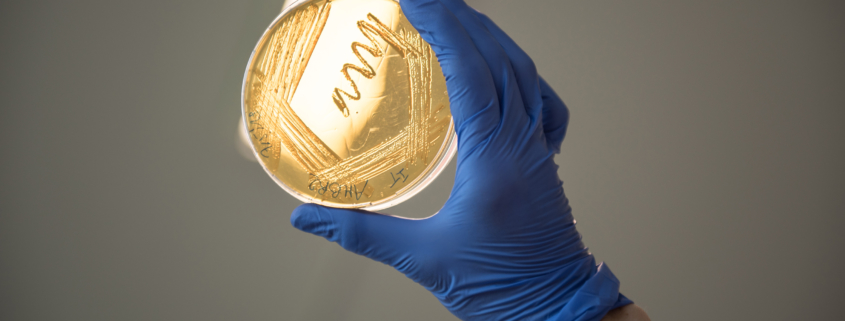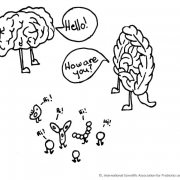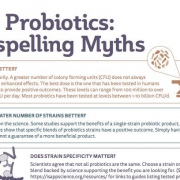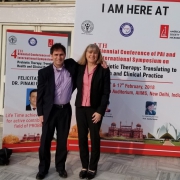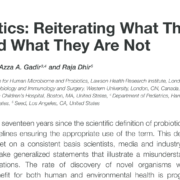The future is microbial: A post-pandemic focus on identifying microbes and metabolites that support health
By Prof. Maria Marco, Department of Food Science and Technology, University of California Davis, USA
The COVID-19 pandemic has been a sobering reminder of the significance that microorganisms have on human life. Despite the tremendous scientific and medical advances of the twentieth century, our best precautions against the virus have been to practice the oldest and most simplistic of all public health measures such as washing hands and maintaining physical distance from others. At the same time, the effectiveness of the new SARS-CoV-2 vaccines and the speed in which they were developed show how sophisticated and advanced our understanding of viruses has become. Taken together, the limitations and successes of responses to the pandemic underscore the power of investment in microbiology research. This research, which was first catalyzed by the pioneering work of Louis Pasteur, Robert Koch, and contemporaries in the late 1800s, was the basis for the overall reduction in infectious diseases during the twentieth century. Continued investment in these efforts will prepare us for the next pandemic threat.
Beyond pathogens to health-promoting microbes
As our attention turns to the promise of the New Year, we may also take this moment to appreciate the fact that microorganisms can also do good. Our “microbial friends” were first promoted by the lauded biologists Élie Metchnikoff, Henry Tissier, and Issac Kendall at the turn of the twentieth century. Since then, nearly another century passed before the power of microorganisms to benefit human health reached wider acceptance.
Marked by the emergence of laboratory culture-independent, nucleic-acid based methods to study microbial communities, there is now excitement in the identification of microorganisms that are important for health promotion. This interest is catalyzed by the urgency to find ways to prevent and treat cardiovascular diseases, cancers, and other non-communicable, chronic conditions that are now the leading causes of death worldwide. Much like the pressure to address infectious diseases as the primary cause of mortality prior to the twentieth century, so too is the need today for sustained research investments in studying how certain microorganisms contribute to, or may be essential for, preventing and treating the greatest threats to public health in the modern era.
Exemplified by the growing number of human microbiome studies, it is now broadly understood that the human microbiome contributes positively to digestive, immune, and endocrine systems function. Systematic reviews and meta-analyses of clinical trials support the use of probiotics for a variety of conditions and there are positive associations between the consumption of fermented dairy foods and good metabolic health. To understand how microbes can be beneficial, numerous mechanisms have been proposed (for example, modulation of the immune system and production of neurochemicals that can impact the gut-brain axis), and these mechanisms apply to both autochthonous microbiota and probiotics alike. However, our understanding of exactly how this occurs lags far behind what is currently known about microorganisms that cause harm.
Identifying microbes & metabolites that maintain health
The future of beneficial microbes is in identifying the specific, health-promoting metabolites, proteins, and other compounds that they make. Presently only a handful of such examples are known. Perhaps most recognized are the short chain fatty acids, butyrate, propionate, and acetate, which are known to bind specific human cell receptors to modulate numerous cell pathways including those that affect metabolism. Other microbial compounds generated as intermediate or end products of microbial metabolism (such as metabolites of amino acids), secondary metabolites (such as bacteriocins), and bacterial cell surface constituents (such as certain membrane proteins) were shown to benefit health, although a more complete description of mechanistic details for their effects remains to be discovered. Precise mechanistic descriptions of “beneficial factors”, or the microbial enzymatic pathways and molecules that induce desired cellular and systemic responses in the human body, will be pivotal for elucidation of the precise ways microorganisms sustain health and well-being (for more detail on this topic see here).
Based on what we know about the complexity of the human microbiome and the now many decades of probiotics research, this effort will require innovation and multi-disciplinary coordination. Just as early microbiologists raced to address the high rates of mortality due to microbial pathogens, we are in a new age where again microorganisms are regarded as emerging public health threats. However, we now have to our advantage the knowledge that not all microorganisms cause harm but instead the majority may offer solutions to the greatest health challenges of the twenty-first century.

